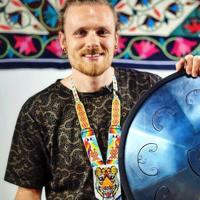Tuvan Overtone Throat Singing
Tuesday 14th May 2024, 5:00 PM - 7:00 PM (London Time)
This two-hour class on Tuvan throat singing will be an opportunity to learn five different styles of overtone singing that first originated in Central Asia. Several styles can be learned quite quickly while others are more complex and require deeper study. This class is great for singers of all levels from absolute beginners to professionals.
Tuvan overtone singing is an entirely unique category in its technique regardless of one’s singing experience. This will be an experiential based class where participants will be guided through different exercises and vocal expressions in generating the five styles of singing listed below. Everyone who attends this class will experience a powerful and deep activation of their voice, natural vibratory resonance, capacity for creativity, healing, and self-expression.
- Kargyraa – Deep, bassy, guttural vibrational singing that Tibetan monks are famous for using in prayer and mantra recitation
- Khoomei – Mid-tone range singing with rich overtones and deep tonality
- Sygyt – High pitched and piercing singing that represents the merging of Heaven and Earth – sounds like a shrieking whistle or an alien visitor
- Khorekteer (Xorexteer) – A high-pitched, wailing singing style famous in Tuva that is often used to pronounce lyrics, mantra, or prayers
- Western Overtone Singing – The western version of a simplified Tuvan Sygyt that almost anyone can learn – can sound hauntingly beautiful when refined to a high expression
Jerry Walsh
Jerry Walsh has been walking the path of dharma and meditation for 16 years and has been a student of the shamanic traditions for 12 years, undergoing intensive initiations under the guidance of his teacher, Maestro Manuel Rufino. Jerry is a gifted vocalist and multi-instrumentalist. He is a member of the sound meditation ensemble, Dream Seed, and...

Attend this course for as little as £22 as part of the Voice Professional Training CPD Award Scheme.
Learn MoreSorry, this is an archived short course...
We have plenty of upcoming short courses coming soon. See details of some of them below or look at the full list of short courses.

Wednesday 4th March 2026
1:00 PM - 2:00 PM
Wednesday 11th March 2026
1:00 PM - 2:00 PM
Wednesday 18th March 2026
1:00 PM - 2:00 PM
Wednesday 25th March 2026
1:00 PM - 2:00 PM
Wednesday 1st April 2026
1:00 PM - 2:00 PM
Wednesday 8th April 2026
1:00 PM - 2:00 PM
(London Time)
Learn to Coach RP and SSBE – a Certificate in Accent Coaching

Louisa Morgan
This six-week course is an opportunity to learn about both Received Pronunciation and Standard Southern British English. Rather than a course in learning how to speak RP/SSBE (there are many brilliant available courses for this already), this course is about learning how to coach it.

Thursday 5th March 2026
1:00 PM - 2:30 PM
Thursday 12th March 2026
1:00 PM - 2:30 PM
(London Time)
Acting Emotion: Perspectives from the Masters

Louisa Morgan
Stanislavski said, “our artistic emotions are, at first, as shy as wild animals and they hide in the depths of our souls.” Michael Chekhov said, our bodies should be like a “sensitive membrane, a kind of receiver and conveyor of the subtlest images, feelings, emotions and will impulses.” And Meisner said we should be “living truthfully under imaginary circumstances.” Join Louisa Morgan in this 2-part course as she explores a range of well-known acting practitioners to investigate what they believed (or believe) about emotion and how they approached it in their work. She'll compare their work to see where they align and where they diverge.


Tuesday 10th March 2026
3:00 PM - 5:00 PM
(London Time)
Living truthfully in the present moment: An introduction to the Meisner Technique!

Abigail Sugden
Sanford Meisner believed that acting is living truthfully under imaginary circumstances. Rooted in behavioural aspects of acting practice, the Meisner Technique is often associated with encouraging actors to live truthfully in the present moment. Aimed at those working within the field of acting, this 2-hour session with Abigail Sugden will focus on the work of Sanford Meisner, introducing the core principles of his technique and discussing the possible benefits to performers.
